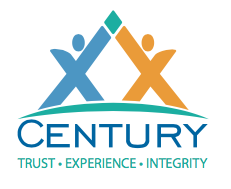Basic Money Management Skills for a Positive Financial Outlook
Posted by Century Support Services on Mar 27, 2023

In honor of April’s National Financial Literacy month, a month dedicated to raising awareness about the importance of financial literacy, we’ve put together money management skills every adult should have to improve their financial outlook. Safeguard your financial future and avoid costly mistakes by following these basic tips.
1. Take Control
If costs are rising, take an honest look at your income and outgoings, and set some smart, realistic financial goals or targets that you want to achieve. Begin by listing the financial goals you have for the future. These may be modest and relatively short-term, like saving enough for a vacation. They might be urgent and essential, like clearing your smaller debts. The more specific your objectives, the more likely you are to make them a reality.
As with all goal-setting, make sure that yours are SMART goals.

2. Organize Your Accounts
Feeling in charge of your finances will make you feel more proactive. Getting organized now is a great way to stay on top of your finances. Do a little research to find the best bank deals for you. Banks may offer incentives, such as reduced fees or cashback, when you switch to them. Most banks offer free online banking, so you can keep on top of income and outgoings from your computer or mobile device. Others might have useful apps to track and manage your spending.
3. Create a budget
And stick to it. It may seem like a chore, but it’s an important part of the process. And it helps you to identify your income-to-debt ratio. The first thing to do is make a list of all your regular income. Second, list your essential expenditure, this includes mortgage or rent payments, water, electricity, food and health insurance. Third, make a list of all non-essential outgoings. These include leisure activities, cable plans and vacations. Finally, target your non-essential list first and see what you can reduce.
4. Manage Your Debts
Not all debt is “bad”. Good debt, such as a mortgage, can boost your credit rating and prove your reliability to lenders. Debt becomes a problem when responding to demands to pay it off are impossible. So, if you have something spare after the essential spending in your budget, consider getting ahead of your creditors and paying off your debts using either the “snowball” or “avalanche” method.

5. Control Your Spending
Know how to separate your must-haves from your nice-to-haves. That’s critical for proper money management. You need a clear picture of your monthly expenses — the money it takes to run your house, feed your family, power your car, and take care of your debts — and put those needs above all else.
Everything beyond that — dinners out, trips to the movie theater, even extracurricular activities for the kids — must come second.
If you’re worried about your ability to prioritize, the envelope budgeting method can be particularly helpful. You can also shop with only cash (this helps you avoid impulse purchases and makes sure that you only spend what you have). Or you may choose to direct deposit some of your earnings into savings, where it’s harder to access for impulsive purchases.
6. Pivoting
Sometimes things don’t work out as planned. Maybe a job falls through, you don’t get that raise you expected, or your rent goes up more than projected. It happens, and a part of good money management is learning to adapt to these unexpected financial mishaps.
This might, of course, mean tapping your emergency fund, determining where you can cut back on spending, or taking on a side job or extra hours if necessary. Having a plan for your money is important, but having backup options? That’s just as critical
7. Get Support
When you’re experiencing financial stress, you can be embarrassed and feel shameful. It can be difficult to reach out to family members and friends to share what you’re going through. However, you can trust that the people who truly care for you will be supportive, understanding, and compassionate. Shame is a very negative emotion that can contribute to your stress load.
Seeking help from a professional with the experience, knowledge, and solutions for your financial situation is an important step. Century has helped hundreds of thousands of people settle debts that they otherwise couldn’t pay, and
Contact Century to Learn About Debt Settlement
 If debt settlement sounds like it might be the right debt reduction strategy for you, contact Century Support Services. Century has helped hundreds of thousands of people settle debts that they otherwise couldn’t pay, and has saved clients a lot of time, aggravation and money in the process. To date, Century has settled more than $1.3 billion in debt and maintains a 94% satisfaction rating.
If debt settlement sounds like it might be the right debt reduction strategy for you, contact Century Support Services. Century has helped hundreds of thousands of people settle debts that they otherwise couldn’t pay, and has saved clients a lot of time, aggravation and money in the process. To date, Century has settled more than $1.3 billion in debt and maintains a 94% satisfaction rating.
To get started, you’ll receive our free assessment and our Certified Debt Specialists will create a personalized program plan for you.
To learn more about the debt settlement process or if you have any general questions relating to how long does debt settlement take or how long will it take to recover from debt settlement, we’re happy to answer any questions.
Contact us today!